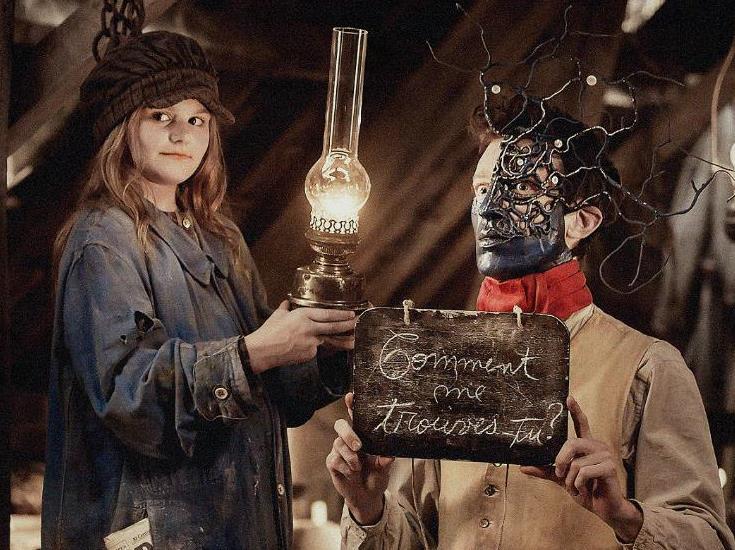Image: Au revoir là-haut.
The Alliance Française French Film Festival opened on Tuesday night with a screening of See You Up There (Au Revoir La Haut) by actor/director Albert Dupontel (with himself as a lead). This movie is an adaptation of Pierre Lemaitre’s Goncourt Prize-winning 2013 novel.
The story is set immediately after WWI and follows the fortunes of two returning soldiers, Albert Maillard (Dupontel) and Edouard Pericourt (Argentinian actor Nahuel Perez Biscayart). Pericourt is an artist from society’s upper echelons and Maillard an accountant; at the end of the war they take the chance to reinvent themselves, in Pericourt’s case faking his own death by switching papers with a dead soldier.
Framed within a police interview in a station in a remote part of Morocco, the film is told in flashback. The two friends witnessed a double murder committed by Lieutenant Pradelle (a seductively villainous Laurent Lafitte), who is not only a ruthless killer but one happy to profit from the misery of others. This event forms part of a tangled plot where Pradelle and Edouard’s father, Marcel (Niels Arestrup, imposing as a wealthy patriarch), represent establishment, power and wealth, while Maillard is the Everyman forced to take a stand. Voiceless Pericourt (having lost his jaw in a pointless sortie instigated by Pradelle) is Art Personified, set against bureaucracy, war and rigidity (patriarchy, if you like; one subtext is Pericourt’s estrangement from his father). A waif, Louise (played with warmth and mischief by Heloise Balster), becomes Pericourt’s voice, interpreting his vocal grunts while he creates an increasingly fabulous set of masks to hide his disfigurement.
Working out of a rundown shed Maillard and Pericourt invent a scam inviting local municipalities to invest in war memorials they have no intention of creating (a venture nicely contrasted with Pradelle’s horrid business practices when it comes to burying the war dead, and a nod to art as satire), which makes them wealthy. One memorably joyous scene involves a cabaret (once an artform concerned with satire and sedition) where revellers fire champagne corks at effigies of political leaders and monarchs – the war-mongers.
This film satisfies on psychological and symbolic levels with scenes of theatrical imagery and tableaux lending weight to its themes: the motif of being buried alive plays out literally and metaphorically, confined spaces in scenes of poverty are contrasted with opulent spacious interiors, and the restriction of mundane undignified labour is set against the freedom of creativity. The business of masking and unmasking dominates as a motif – one scene has Pericourt literally unmasked by the child Louise in a moment of silent mutual comprehension. Economic realities, class differences, power struggles and the courage to tell the truth are also elements in this conceptually crowded movie; if there is a fault with See You Up There it is with the limitation of range being at war with its ambition; the novel, of course, can explore many ideas in a way film cannot. Along with flashback the film’s storytelling devices include expository back story revealed by way of Pericourt’s morphine-induced hallucinations.
This is a story of men; Woman is present as truth teller, again on a symbolic and literal level: Maillard tries to impress household maid (Melanie Thierry) with his new yellow suit but she tells him he looks like a fat canary. Romantics will be kept happy with a sweetly understated love story, and the presence of humanity in the finale comes as a pleasing relief.
Despite its narrative and political concerns, the film’s dominant focus is on its homage to 1920s’ visual aesthetics: each frame is a singular work of art, splendid with its attention to measured colour and composition. The blues and browns of uniform, sky, earth and battlefield give way to an interior palette of tans, bronzes and golds. The images often reference surrealism and are shot with an exquisitely painterly sensibility; the sensual cinematography reminiscent of Catherine Breillat’s work, such as the film A Former Mistress.The camera swoops down to capture the action in a scene from a bird’s eye view or leads the eye through a hole, keyhole or door suggested by the framing of the set.
See You Up There can be thought of as an exercise in style and substance even while it contrasts appalling human behavior against innocence and the world of the imagination, but a lack of deep emotional engagement with the characters doesn’t detract from the pleasure it offers the viewer.
Rating: 4 stars out of 5
Au revoir là-haut
Dir/scr: Albert Dupontel. France. 2017. 117 mins
Production companies: Stadenn Prod., Manchester Films, Gaumont, France 2 Cinema
Cast: Nahuel Perez Biscayart, Albert Dupontel, Laurent Lafitte, Niels Arestrup, Emilie Dequenne, Melanie Thierry
Director: Albert Dupontel
Screenwriters: Albert Dupontel, with the participation of Pierre Lemaitre
Based on the novel by Pierre Lemaitre
Actors:
Director:
Format:
Country:
Release:





